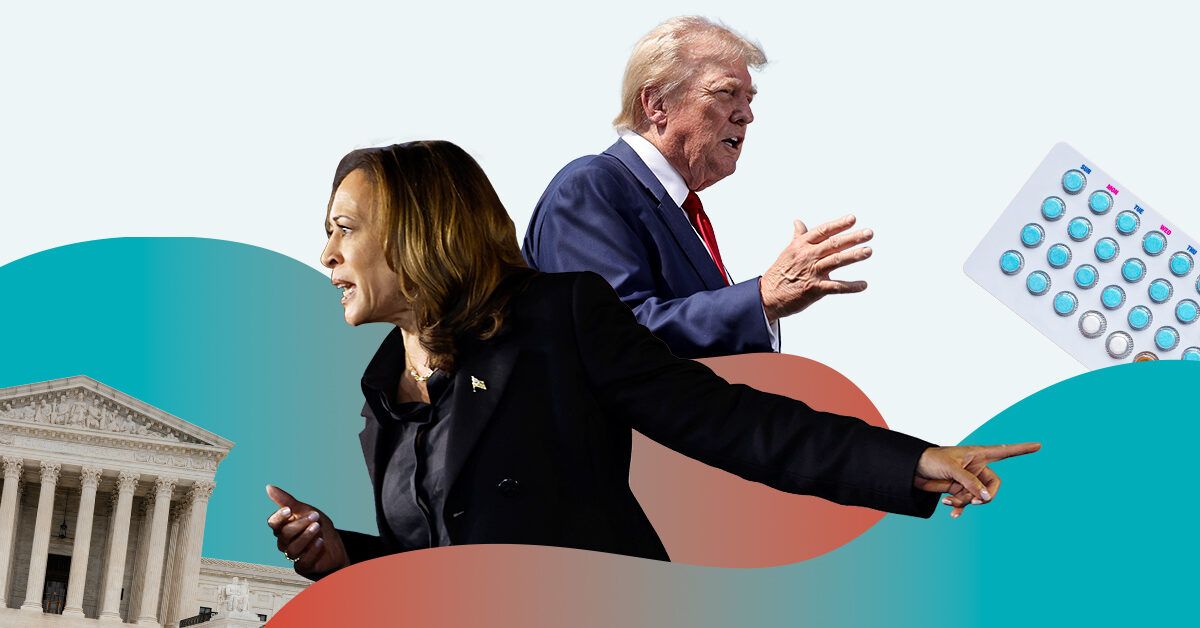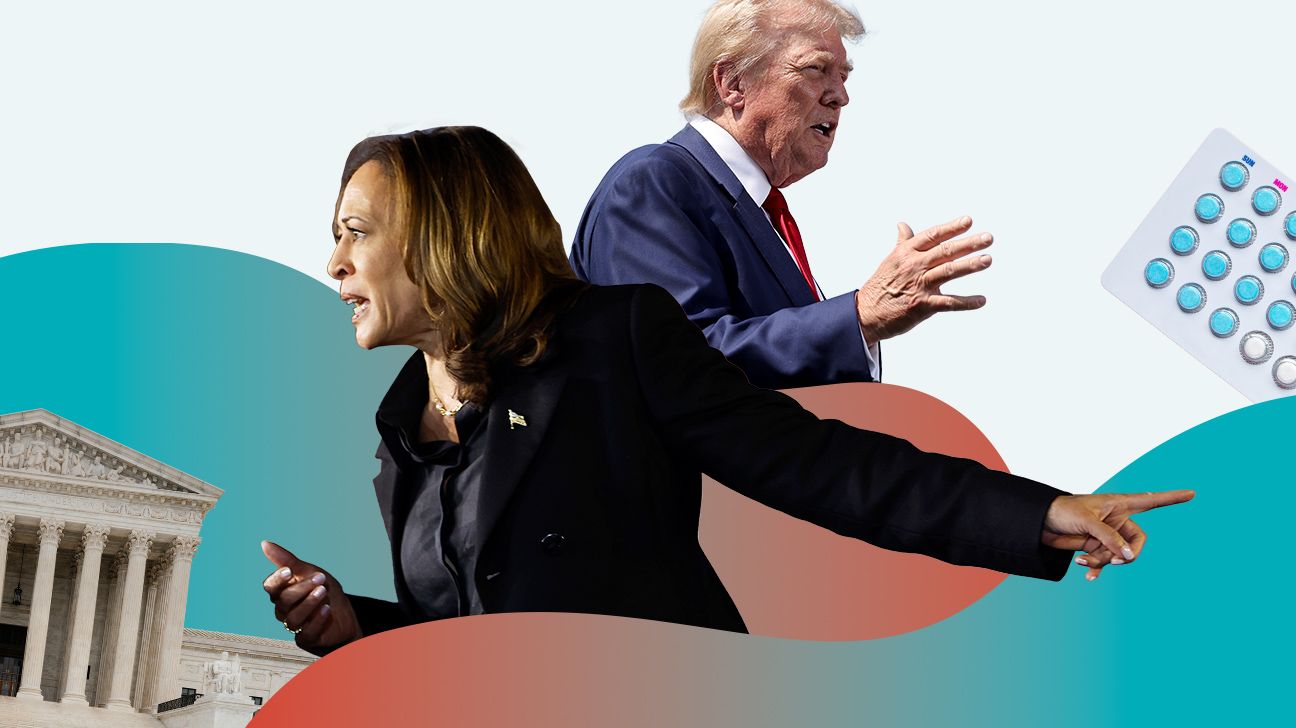How Trump, Harris Differ on Reproductive Health Issues in 2024 Presidential Election


Abortion access, IVF, and other reproductive rights are focal points of the 2024 presidential race.
On November 5, abortion access and reproductive rights will be top of mind for millions of voters as they head to the polls to determine the next president of the United States.
Constitutional amendment measures in 10 key states could restore abortion rights that have been restricted since the U.S. Supreme Court overturned Roe v. Wade in 2022.
Presidential candidates Vice President Kamala Harris and former President Donald Trump have conflicting views on abortion and reproductive healthcare.
Harris and running mate Tim Walz remain committed to protecting reproductive rights. Meanwhile, Trump has changed his position on abortion several times throughout his presidential campaign and over 25 years as a public figure.
Trump has neither confirmed nor denied whether he would sign a nationwide abortion ban if elected to office.
The rights to other reproductive freedoms, such as access to in vitro fertilization (IVF), are also on the ballot, with some religious groups condemning the procedure and conservative state courts challenging the concept of personhood.
Continued access to contraceptive care, including birth control, comprehensive sex education, and family planning services, also rests in the hands of voters this election.
“Donald Trump and JD Vance and their allies are extremely dangerous for our reproductive freedom,” said Olivia Capella, associate director for state advocacy communications at Planned Parenthood Votes.
“We saw under the previous Trump administration unprecedented attacks on the abortion care landscape nationwide and the federal family planning program, which provides essential care to low-income people across the country, as well as attacks on the broader healthcare system. We’re extremely concerned about the prospect of a second Trump administration as well as control of Congress,” Capella told Healthline.
Abortion access
A recent Pew Research poll shows 63% of U.S. adults believe that abortion should be legal in all or most cases. Despite this, millions of people have been unable to access safe and legal abortion in the 2 years since the landmark Dobbs v. Jackson Women’s Health Organization ruling that overturned Roe v. Wade.
According to Guttmacher Institute data:
- 14 states have total abortion bans with very limited exceptions
- 27 states have abortion bans based on gestation, 8 states ban abortion at or before 18 weeks, and 19 states ban abortion after 18 weeks
Most abortions occur during the first trimester, while abortions later in pregnancy are less common. According to recent data from the Centers for Disease Control and Prevention (CDC), 93.5% of abortions occur within or at the end of the first trimester, and only 0.9% of abortions occur at 21 weeks or later.
Post-Dobbs, a national survey shows 1 in 5 OB-GYNs feel constraints on miscarriage management and pregnancy-related emergencies. In addition, a much larger percentage of OB-GYNs (70%) believe that racial and ethnic inequities in maternal health have increased as a result of the Dobbs decision.
A growing body of evidence sheds light on the negative reproductive health outcomes tied to abortion bans and restrictions. In 2023, the Guttmacher Institute estimated that 171,000 people traveled to another state to obtain abortion care.
- In Alabama, the state’s attorney general has threatened to prosecute people for crossing state lines to obtain an abortion.
- In Georgia, one woman died after being denied lifesaving abortion care.
- In Florida, where there is a 6-week abortion ban, a woman was forced to carry a baby to term who was born without kidneys and would later die in her arms.
In some states, there are exceptions to abortion bans, such as rape or incest, but access to abortion care in these places remains an obstacle, particularly for people of color, people with low incomes, and people living in rural areas or maternal care deserts.
“Abortion has always been essential reproductive healthcare for so many people. In the post-Dobbs era, it’s become very apparent to people across the country how critical that care is, regardless of where in pregnancy a person is or their life circumstances,” Cappello said.
“When people are denied abortion care, they are more likely to struggle financially, more likely to have healthcare complications later, and for their children to have a tougher time as well, both in their development and in their future education, continuing the cycle of poverty and strife for families.”
— Olivia Cappello, Planned Parenthood Votes
A national abortion ban remains at the forefront of the anti-abortion movement, whether through legislation or enforcing a 19th-century anti-obscenity law known as the Comstock Act.
Under a second Trump administration, a looming political initiative known as Project 2025 could threaten reproductive freedom for all.
Donald Trump’s stance on abortion
- Trump has neither confirmed nor denied he would sign an abortion ban if passed by Congress. He dodged questions about it during the presidential debate.
- Trump has repeatedly denied involvement with Project 2025 despite some of his former advisers being heavily involved with the conservative roadmap for the next administration. A nationwide abortion ban is central to this right-wing agenda.
- Trump and running mate JD Vance argue that access to abortion should be left to each state.
- While Trump has shifted his abortion stance throughout his campaign, Vance openly opposes abortion and has said it should be “illegal” in all 50 states.
- Trump has said his administration “will be great for women and their reproductive rights” in a post on his social media platform Truth Social.
- Trump also said that he supports exceptions to abortion bans in cases of rape, incest, and when the “life of the mother is at risk.”
“Our biggest concern is that we know that if we have a second Trump presidency, we will see an abortion ban nationwide, and I cannot begin to convey how dangerous that would be,” Amy Williams Navarro, director of government relations at Reproductive Freedom for All, told Healthline.
“We’re already seeing over 20 states with severe restrictions or complete bans on abortion and the consequences of those bans — and we would see that exacerbated across the country, with people in all 50 states unable to access critical abortion care.”
— Amy Williams Navarro, Reproductive Freedom for All
Kamala Harris’s stance on abortion
- Harris has made abortion access and reproductive rights a focus throughout her campaign. She has referred to states where abortion access is restricted as “Trump abortion bans.”
- In her keynote speech at the Democratic National Convention, Harris said she would sign a bill into law that would restore reproductive freedom.
- Harris’s campaign website states that as president, she will never allow a national abortion ban to become law.
“Kamala Harris has shown she is a steadfast champion for reproductive freedom, not only in the executive actions she has supported through the Biden administration to protect and secure access to reproductive healthcare, but also in the ways that she speaks about abortion access, and the importance of fertility care and comprehensive healthcare,” Cappello said.
“We are confident she will continue making progress on those goals if elected president. Of course, not everything can be done via an executive order, so she does need the support of a strong Congress to make some of these changes,” she added.
Abortion pill access
In June 2024, the Supreme Court voted unanimously to preserve access to mifepristone, but some experts speculate the abortion medication could again face scrutiny under a Republican administration.
Post-Dobbs, access to medication abortion, which typically includes mifepristone and misoprostol, is crucial.
- Medication abortion is safe and effective. It has been used in clinical settings since the Food and Drug Administration (FDA) approved mifepristone in 2000.
- Medication abortion has become increasingly common, comprising 63% of clinician-provided abortions in 2023, a 53% jump from 2020, according to Guttmacher Institute data.
- Medication abortion can be safely self-managed at home via telehealth. Self-managed abortions rose sharply after Roe was overturned.
- Using mifepristone or misoprostol alone can safely end a pregnancy.
Will Trump ban the abortion pill?
- Trump has shifted his position on whether or not he’d ban the abortion medication mifepristone.
- Vance said that Trump would not ban the abortion pill shortly after the former president said he would be open to it.
“I have significant concern that a Trump administration would compel the FDA to make non-evidence-based decisions about mifepristone, as well as contraception and other medications and devices within its purview,” said Sarah W. Prager, MD, a professor in the Department of Obstetrics and Gynecology at the University of Washington School of Medicine.
“During COVID, Trump installed a right-wing journalist as the FDA spokesperson, politicizing the organization that historically has maintained more neutrality. If elected again, I would not be surprised if Trump were to further erode the scientific and political integrity of the FDA,” Prager told Healthline.
Harris vows to preserve abortion pill access
- Harris has been a leader during the Biden administration in preserving access to mifepristone.
- When mifepristone became available at retail pharmacies earlier this year, the vice president supported this move.
“The President and I stand with the majority of Americans who believe women should have the freedom to make decisions about their own body and their own lives. We remain committed to defending access to reproductive healthcare, including medication abortion,” Harris wrote in a White House statement.
“Our Administration will not waver in our dedication to preserving access to essential medication and defending the FDA’s independent, evidence-based approval and regulation of safe and effective drugs,” Harris continued.
In vitro fertilization (IVF)
In February, the Alabama Supreme Court ruled that frozen embryos are “children” in the eyes of the law, temporarily halting IVF treatments in the state.
The ruling challenged the concept of personhood, fueling momentum among religious conservatives who oppose abortion at any point after conce
Source: View source
